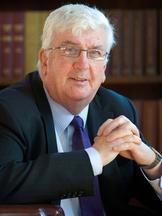
















Professor Alistair Ulph
Alistair Ulph is Associate Vice-President & Professorial Research Fellow of the Sustainable Consumption Institute. Professor Ulph was born in Glasgow in 1946, where he went to school and then to the University of Glasgow from which, in 1968, he was awarded a first-class degree in Economics and Statistics. He was awarded a scholarship to attend the University of Oxford and in 1970 obtained a B.Phil. in Management Studies with distinction. Following employment at the Oxford Centre for Management Studies, Stirling University and Australian National University, he spent 25 years (1979-2004) at the University of Southampton, the last 20 of these as Professor of Economics, with spells as Visiting Professor at the University of British Columbia (1985), Australian National University (2002) and University of California Santa Barbara (2002).
His research interests are mainly in the field of environmental and resource economics, recently focussing on international aspects of environmental and trade policies, though he has also published in labour economics, industrial economics and public economics. Over his career he has published 6 books and over 100 refereed papers, has raised over £600k in research grants (from research councils, UK and EU government departments, and industry) supervised 14 PhD students and consulted for a range of government agencies and private companies. He was appointed Economic Assessor for the Hinkley Point C Public Inquiry (1989-90) and elected President of European Association of Environmental and Resource Economists (2000-2001) and Fellow of the Royal Society of Arts (2000-). At the University of Southampton he played a wide range of roles in academic management, including: Head of Department of Economics (1986-9), Dean of the Faculty of Social Sciences (1989-92) and Deputy Vice-Chancellor (1995-2001) with responsibility for strategic planning and resource allocation, research strategy, estates strategy.
Between April 2004 and 2010 he held the post of Vice-President and Dean of the Faculty of Humanities in The University of Manchester. With over 15,000 students, 1800 academic staff, a budget of £150m and 7 Schools (Arts, Histories & Cultures; Education; Environment & Development; Languages, Linguistics & Cultures; Law; Manchester Business School; Social Sciences) Humanities is the largest and most diverse Faculty in The University of Manchester, and probably in the UK. Since appointment he has developed strategic and operational plans to achieve the objective of making the Faculty of Humanities part of one of the top research universities in the world by 2015, lead a strategic review to make Manchester Business School one of the top 25 Business Schools in the world and has launched several major initiatives, including the Brooks World Poverty Institute, the Centre for Chinese Studies and the Harvard-Manchester Initiative for Social Change.
